UnitCouldyoupleasecleanyourroom(00001)(00002)
初中英语《Could you please clean your room(1)》优质课教案、教学设计

Unit 3 Could you please clean your room? (Section A 1a-2d)【知识技能目标】"掌握并灵活运用本课的重点词汇rubbish fold sweep floor mess"重点短语sweep the floor, work on, finish doing, take out the rubbish"听懂“请求做家务活动”的相关话题及文章;学会有礼貌地提出请求和请求准许【情感态度目标】主动地去帮助家人做杂物【自主学习】1. 洗餐具2. 倒垃圾3. fold the clothes 5. make your/the bed4. sweep the floor6.打扫客厅7.没问题8. 出去吃饭9. stay out late 11.get a ride 10.go to the movies 12.work on13.做完某事14. 干净又整洁【教学设计】Step1 Lead-in(Show two pictures of a room, one is clean and the other is in a mess. Compare the pictures and show the key sentence : Could you please clean the room? Then learn some new words through some phrases.)T: Class, let’s look at the picture. Is it very clean? Now, let’s look at this picture, is it clean too?S: No , it is dirty.T: Yes, it is in a mess. Suppose it is your room, could you please clean your room? (Lead in the topic, and write it on the Bb)Then learn some new words and phrases by reading the pictures.1Game playing:Show pictures and ask the Ss to guess What is …..doing? to practice the phrases.Step2. Presentation1.Listening and complete the chart .Ask the Ss to listen to the tape carefully and complete the chart. Then check the answers.2.Practice and pairwork by using the following form:A: Could you please ?B: Yes, sure. Can you ?A: OK, could you please ?I am going to . B: No problem.Then ask two pairs to practice the dialogue by using “Could you please…….?”Step3. Listening practice.1.Show the chart of 2a and 2b. Make sure the questions and the phrases.2.Listen to the tape and check the answers.3.Practice in pairs and make dialogues like the following:A: Could I use your ?B: Sorry. I'm going to .A: Well, could I ?B: Yes, you can. But( No, you can't I have to )Step4. Role-play1.Read and listen.Make the Ss listen to the tape first, then read by themselves.2.Answer the questions. Show the questions and make them answer them.【合作探究】1. help out 动词短语,表示在某人繁忙或遇到困难时“给予帮助”。
《Couldyoupleasecleanyourroom》PPT课件(第1课时

1. do the dishes 3. fold your clothes 5. make your bed
2. take out the rubbish 4. sweep the floor 6. clean the living room
Do you do the dishes at home?
Listen. Peter asks his father if he can do four
2a things. What does his father say? Check (√)
“yes” or “no”.
Peter wants to… Peter’s father says…
go out for dinner. √ Yes No
Brother: But the house is already pretty clean and tidy! Sister: Yes, well, it’s clean, but it’s not “mother clean”!
Language points
1.Peter, could you please take out the rubbish?
Unit 3 Could you please clean your room?
R 八年级下册
第1课时
Lead-in
What do you usually do at home?
do homework watch TV
sleep
What do you usually do to help your parents?
go to.
Yes√ No
get a ride.
Yes√ No
2b
Unit1could_you_please_clean_your_room_知识点及短语祥解

Unit3 知识点1.Could you please do sth ?请你(做)......好吗?Could用于提出请求,不是can的过去式,是委婉、礼貌的说法。
回答用can.2.【短语】take out the rubbish/trash倒垃圾take a walk 散步take away 拿走/取走take back 收回take place 发生take off 脱下;起飞3.do the +名词:do the dishes洗餐具do the +doing:do the cleaning 打扫卫生do one’s + 名词:do one’s housework/ homework 做家务/家庭作业do some +doing:do some reading/ shopping读些书/购物4.表示时间、距离、金额、度量等词语作主语时,通常被视作整体,谓语动词用单数形式。
4.enough 修饰名词时,置于名词前;修饰形容词、副词时,后置。
6.the minute = as soon as “一...... 就......”7.in front of指在物体外部的前面in the front of指在物体内部的前面8. come 短语:come over 过来come back 回来come up with想出come true实现come down下来come from=be from来自,出生于come in/into进入,进来come on赶快,加油come along走吧,过来,快点come and go来来去去come up上来come out出来,(花)开,(照片)冲洗出来8.all the time = always一直;总是time 短语:on time 按时in time 及时at the same time同时the first time 第一次at times 有时last time上次next time 下次9.neither +助动词+主语“某人(主语)也不”neither 做主语确定动词用三单。
Unit 11 could you please clean your room人教版英语八年级上册
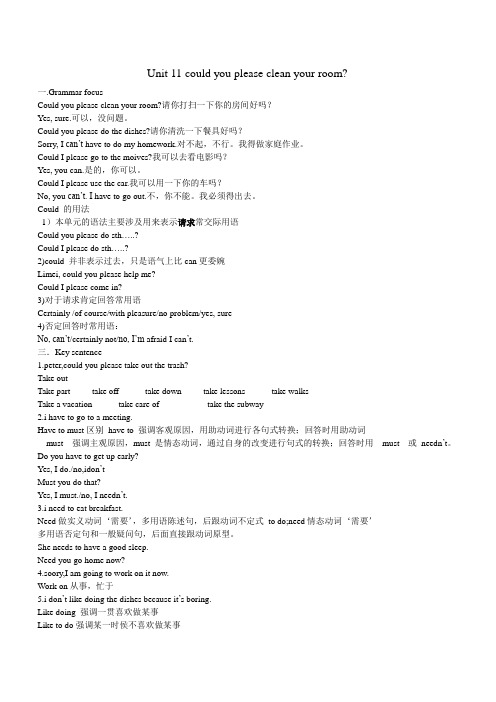
Unit 11 could you please clean your room?一.Grammar focusCould you please clean your room?请你打扫一下你的房间好吗?Yes, sure.可以,没问题。
Could you please do the dishes?请你清洗一下餐具好吗?Sorry, I can’t have to do my homework.对不起,不行。
我得做家庭作业。
Could I please go to the moives?我可以去看电影吗?Yes, you can.是的,你可以。
Could I please use the car.我可以用一下你的车吗?No, you can’t. I have to go out.不,你不能。
我必须得出去。
Could 的用法1)本单元的语法主要涉及用来表示请求常交际用语Could you please do sth…..?Could I please do sth…..?2)could 并非表示过去,只是语气上比can更委婉Limei, could you please help me?Could I please come in?3)对于请求肯定回答常用语Certainly /of course/with pleasure/no problem/yes, sure4)否定回答时常用语:No, can’t/certainly not/no, I’m afraid I can’t.三.Key sentence1.peter,could you please take out the trash?Take outTake part take off take down take lessons take walksTake a vacation take care of take the subway2.i have to go to a meeting.Have to must区别have to 强调客观原因,用助动词进行各句式转换;回答时用助动词must 强调主观原因,must 是情态动词,通过自身的改变进行句式的转换;回答时用must 或needn’t。
Unit 1Could you please clean your room课件

―Could you please take the dog for a walk?‖ she asked. ―Could I watch one show first?‖ I asked. ―No!‖ she replied angrily. ―You watch TV all the time and never help out around the house! I can’t work all day and do housework all evening.‖ ―Well, I work all day at school, too! I’m just as tired as you are!‖ I shouted back.
His father’s reasons I have to do some work You have to clean your room I need to eat breakfast. You have a basketball game
2c. Pair work
A: Could I please use your computer? B: Sorry. I’m going to work on it now. A: Well, could I watch TV? B: Yes, you can. But first you have to clean your room.
--
Sorry ,I can’t.
Could you please do the dishes? Sorry , I can’t.
Cindy, could you please sweep the floor?
Sure./Of course/certainly
人教版八年级下英语Unit 3 Could you please cleanyourroom知识总结
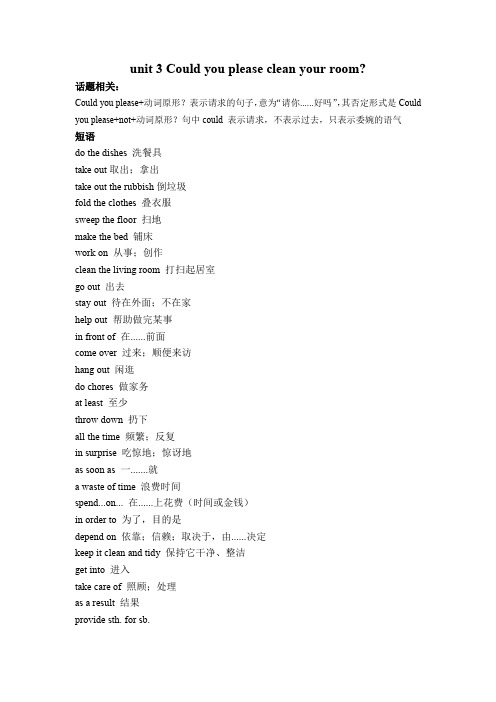
unit 3 Could you please clean your room?话题相关:Could you please+动词原形?表示请求的句子,意为“请你......好吗”,其否定形式是Could you please+not+动词原形?句中could 表示请求,不表示过去,只表示委婉的语气短语do the dishes 洗餐具take out取出;拿出take out the rubbish倒垃圾fold the clothes 叠衣服sweep the floor 扫地make the bed 铺床work on 从事;创作clean the living room 打扫起居室go out 出去stay out 待在外面;不在家help out 帮助做完某事in front of 在......前面come over 过来;顺便来访hang out 闲逛do chores 做家务at least 至少throw down 扔下all the time 频繁;反复in surprise 吃惊地;惊讶地as soon as 一.......就a waste of time 浪费时间spend...on... 在......上花费(时间或金钱)in order to 为了,目的是depend on 依靠;信赖;取决于,由......决定keep it clean and tidy 保持它干净、整洁get into 进入take care of 照顾;处理as a result 结果provide sth. for sb.=provide sb. with sth. 为某人提供某物a developed country 一个发达国家a developing country 一个发展中国家a life of independence 独立的生活an independent country 一个独立自主的国家have no idea “不知道”=don't knowtake care of “照顾;处理”=look after=care for take good care of “好好照顾......”=look after.....well as a result 结果;因此as a result of 由于.......;作为......结果句型和固定结构finish doing sth. 做完某事neither+连系动词be/助动词/情态动词+主语. .....也不hate to do sth. 厌恶做某事let sb. do sth. 让某人做某事spend...doing sth. 花费......做某事provide sth. for sb. 向某人提供某物learn to do sth. 学会做某事learn how to do sth. 学会怎样做某事do one's part in (doing) 尽自己的职责做某事as.....as... 与.......一样not as/so...as... 不如......borrow sth. from sb. “向某人借某物”hate sb./sth. 讨厌某人/某物hate to do sth./doing sth. 厌恶做某事enjoy doing sth 喜欢做某事buy sb.sth.=buy sth. for sb. "给某人买某物invite sb. to +地点名词“邀请某人到某地”invite sb. to do sth. “邀请某人做某事”make sb. do sth. 让/使某人做某事help with sth. =help (to) do sth.帮忙做某事There is no need for sb. to do sth.“对于某人来说,没有必要做某事”解释minute n.分钟;片刻(1)any minute now “随时;马上;在任何时刻”,表示事情有可能在极短的时间内发生或眼下就要发生。
八年级英语上册unitCouldyoupleasecleanyourroom?课件人教新目标版

Thanks for _t_a_k_in_g__ __c_a_r_e__ __o_f__ my dog. Could you please ___d_o__ these things __e_v_e_ry__ __d_a_y__? Take
him __fo__r _ __a___ __w_a_lk__. Give him water and __fe_e_d__ him. Then _w__a_s_h_ his bowl. Play __w__it_h__ him. Don’t __f_o_rg_e_t__ __t_o__ __m_a_k_e__ his bed. Have fun! __S_e_e___ you next week.
stay out late
use the car
get a ride
work on the cபைடு நூலகம்mputer
watch TV
do my homework
go to the meeting
need to eat breakfast
have a test
have to go out
do chores
do the laundry
make breakfast
help make dinner
do the shopping
go to the store
borrow some money
buy some drinks and snacks
invite my friends to a party
use your CD player
PAIRWORK
1. buy some drinks and snacks 2. borrow some money 3. clean your room 4. invite my friends to a party 5. got to the store 6. use your CD player 7. take out the trash 8. make your bed
八年级上Unit 1 Could you please clean your room

八年级英语(上)Unit 1 Could you please clean your room?单元重点内容一.词形转化:过去式 1.sweep----swept 2.throw----threw 3.lend----lent 4.provide----provided 5.depend----depended 6.develop----developed 7.drop----dropped 8.borrow----borrowed 9.make----made10.fold----folded 11.clean----cleaned 12.take----took 13.stay---stayed 14.get----got 15.eat----ate 16.see----saw e-----came 18.sit----sat 19.reply----replied 20.happen----happened 21.show----showed 22.hang----hung 23.try----tried 24.invite---invited 25.spend----spent 26.mind----minded 27.teach----taught 28.keep----kept 29.fall----fell 30.learn----learnt/learned 31.agree----agreed 32.write----wrote 33.pass----passed 34.passed(同义词)past 35.neither(反义词)too 36.fair(名词)fairness 37.fair(反义词)unfair 38.develop(名词)development 39.ill(名词)illness 40.dish(名复)dishes 41.borrow(反义词)lend二.词组:1.do the dishes洗餐具2.take out the rubbish倒垃圾3.fold your clothes叠衣服4.sweep the floor扫地5.make one’s bed(make your bed)=make the bed整理床铺6.clean the living room打扫起居室7.go out for dinner出去吃饭8.go to the movies去看电影9.stay out late等在外面晚点10.get a ride搭车11.work on使用,从事12.help out with a few things帮着做几件事13.at least至少14.finish doing sth完成某事finish watching this show看完这个节目15.be angry with sb和某人生气16.be angry at sth.因某事而生气17.solve the problem=work out the problem解决问题e home from school放学回家19.sit down坐下20.in front of在...前面e over过来22.take the dog for a walk 带着狗去散步23.all the time 一直,始终24.all day=the whole day整天25.do the housework=do chores做家务26.as+形原/副原+as和......一样27.not as+形原/副原+as和......不一样28.finally=at last=in the end最后e home from work工作回家30.share the housework分享家务31.what happened发生什么事?怎么啦?32.have a clean and comfortable home拥有一个干净而舒适的家33.as soon as一......就...... 34.in surprise吃惊地35.hang out with my friends和朋友们一起去闲逛36.pass me the salt=pass the salt to me把盐递给我37.borrow sth from sb/sw向某人借某物38.lend sth to sb=lend sb sth把某物借给某人39.help sb do /to do sth=help sb with sth帮助某人做某事40.fold the clothes for sb为某人叠衣服41.something to drink/eat喝//吃的东西42.invite sb to do sth邀请某人做某事43.invite sb to sw邀请某人去某地44.go to the store=go shopping=go to the shop去商店购物45.on Monday在周一46.a little more carefully更仔细一点47.spendtime/money on sth=spend time/money doing sth花钱买某物/花费时间做某事48.depend on依赖49.as a result结果50.the +形容词比较级,the +形容词的比较级表示越来越...... 51.agree with同意52.in order to do为了做53.mind doing sth介意做某事54.look after=take care of=care for照顾55.have no time to do没有时间做某事56.provide sb with sth=provide sth for sb为某人提供某物三重要句子:1.Tony, could you please help out with a few things?托尼,你可以帮着做几件事吗?辨析:a few/ few/ a little/ little(2013.重庆)The girl in purple is new here, so__________.A.fewB.a fewC.littleD.a little2.Did they solve the problem?他们解决问题了吗?3.I’m just as tired as you are!我和你一样累。
2021年八年级英语Unit Could you please clean your room教案(
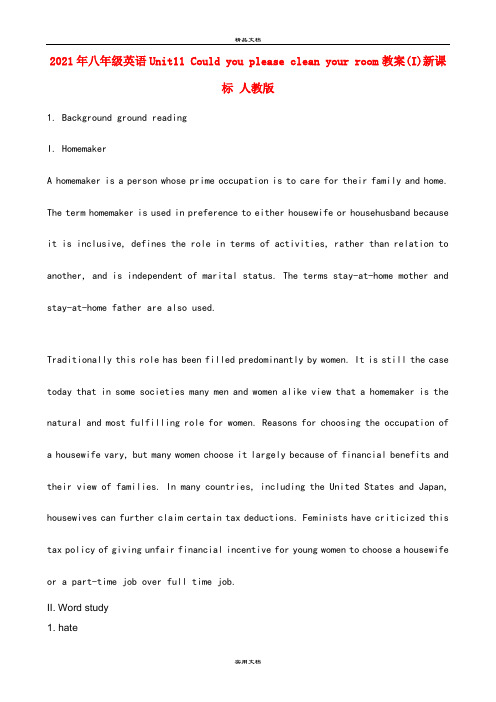
2021年八年级英语Unit11 Could you please clean your room教案(I)新课标人教版1.Background ground readingI. HomemakerA homemaker is a person whose prime occupation is to care for their family and home. The term homemaker is used in preference to either housewife or househusband because it is inclusive, defines the role in terms of activities, rather than relation to another, and is independent of marital status. The terms stay-at-home mother and stay-at-home father are also used.Traditionally this role has been filled predominantly by women. It is still the case today that in some societies many men and women alike view that a homemaker is the natural and most fulfilling role for women. Reasons for choosing the occupation of a housewife vary, but many women choose it largely because of financial benefits and their view of families. In many countries, including the United States and Japan, housewives can further claim certain tax deductions. Feminists have criticized this tax policy of giving unfair financial incentive for young women to choose a housewife or a part-time job over full time job.II. Word study1. haten.[U] 恨;憎恨;憎恶very great dislike: He looked at me with hate. 他憎恨地看着我。
人教版英语八年级下册Unit 3《Could you please clean your room》
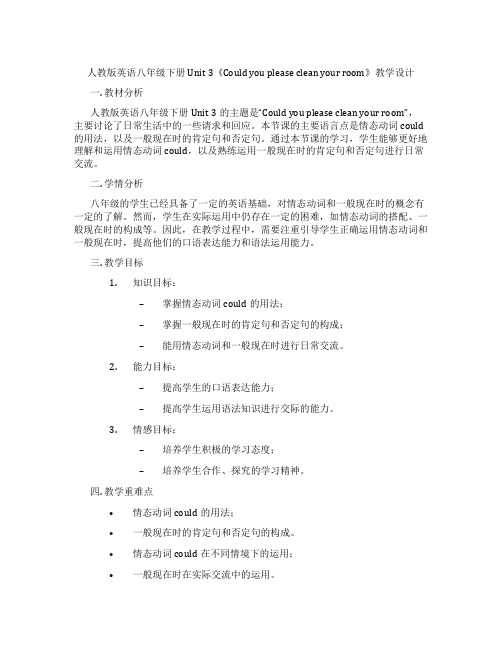
人教版英语八年级下册Unit 3《Could you please clean your room》教学设计一. 教材分析人教版英语八年级下册Unit 3的主题是“Could you please clean your room”,主要讨论了日常生活中的一些请求和回应。
本节课的主要语言点是情态动词could 的用法,以及一般现在时的肯定句和否定句。
通过本节课的学习,学生能够更好地理解和运用情态动词could,以及熟练运用一般现在时的肯定句和否定句进行日常交流。
二. 学情分析八年级的学生已经具备了一定的英语基础,对情态动词和一般现在时的概念有一定的了解。
然而,学生在实际运用中仍存在一定的困难,如情态动词的搭配、一般现在时的构成等。
因此,在教学过程中,需要注重引导学生正确运用情态动词和一般现在时,提高他们的口语表达能力和语法运用能力。
三. 教学目标1.知识目标:–掌握情态动词could的用法;–掌握一般现在时的肯定句和否定句的构成;–能用情态动词和一般现在时进行日常交流。
2.能力目标:–提高学生的口语表达能力;–提高学生运用语法知识进行交际的能力。
3.情感目标:–培养学生积极的学习态度;–培养学生合作、探究的学习精神。
四. 教学重难点•情态动词could的用法;•一般现在时的肯定句和否定句的构成。
•情态动词could在不同情境下的运用;•一般现在时在实际交流中的运用。
五. 教学方法1.任务型教学法:通过设定各种现实生活中的任务,引导学生运用所学知识进行完成,提高学生的实际运用能力。
2.情境教学法:创设各种生活情境,让学生在真实的环境中感受和理解语法知识。
3.合作学习法:学生进行小组讨论和合作,培养学生的团队精神和学习兴趣。
六. 教学准备1.教学材料:人教版英语八年级下册教材;2.教学辅助材料:PPT、图片、卡片等;3.教学设备:投影仪、电脑、黑板等。
七. 教学过程1.导入(5分钟)–利用PPT展示一些杂乱的房间图片,引导学生谈论房间的情况,激发学生的学习兴趣。
八年级英语下册Unit3《Couldyoupleasecleanyourroom》(讲)(含解析)(新版)人教新目标版
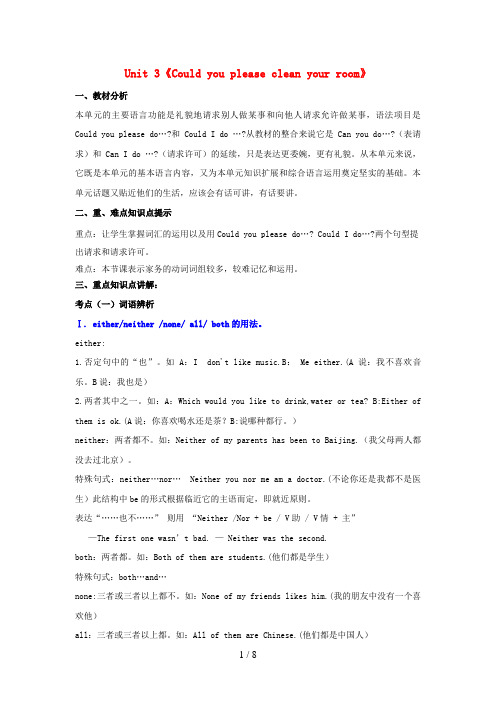
Unit 3《Could you please clean your room》一、教材分析本单元的主要语言功能是礼貌地请求别人做某事和向他人请求允许做某事,语法项目是Could you please do…?和Could I do …?从教材的整合来说它是Can you do…?(表请求)和Can I do …?(请求许可)的延续,只是表达更委婉,更有礼貌。
从本单元来说,它既是本单元的基本语言内容,又为本单元知识扩展和综合语言运用奠定坚实的基础。
本单元话题又贴近他们的生活,应该会有话可讲,有话要讲。
二、重、难点知识点提示重点:让学生掌握词汇的运用以及用Could you please do…? Could I do…?两个句型提出请求和请求许可。
难点:本节课表示家务的动词词组较多,较难记忆和运用。
三、重点知识点讲解:考点(一)词语辨析Ⅰ. either/neither /none/ all/ both的用法。
either:1.否定句中的“也”。
如 A:I don't like music.B: Me either.(A说:我不喜欢音乐。
B说:我也是)2.两者其中之一。
如:A:Which would you like to drink,water or tea? B:Either of them is ok.(A说:你喜欢喝水还是茶?B:说哪种都行。
)neither:两者都不。
如:Neither of my parents has been to Baijing.(我父母两人都没去过北京)。
特殊句式:neither…nor… Neither you nor me am a doctor.(不论你还是我都不是医生)此结构中be的形式根据临近它的主语而定,即就近原则。
表达“……也不……” 则用“Neither /Nor + be / V助 / V情 + 主”—The first one wasn’t bad. — Neither was the second.both:两者都。
八年级英语上册 Unit 1 Could you please clean your room(第1课时)教案

Unit 1 Could you please clean your room?Period 1 Section A (1a – 2c)Teaching aims:1. Words and expressions:Rubbish; fold; sweep; floor ;mess; throw; neither; shirt; pass; mess; do the dishes, make the bed, take out the rubbish, fold the clothes, sweep the floor, clean the living room ……2. Sentences:①--Could you please take out the rubbish?. --Sure. / Sorry, I can’t. I have to finish homework first.②. Could I use your computer?Sorry. I'm going to work on it now.③. Well, could I watch TV?Yes, you can. But first you have to clean your room.Ability object:1. Make polite requests and ask for permission.2. improve speaking and listening skills.Moral objects:Learn to be polite, love doing housework and make requests and ask for permission politely.Teaching Important :Words and expressions, and sentences:Make polite requests and ask for permission.Teaching difficult points:Make polite requests and ask for permission.Teaching procedures:Step 1 Warming-upSing the song and dance to the musicStep 2 Preparation test.1. Watch the photos and talk about them “What does he do every day?’ and learnthese phrases: do chores, do the dishes, make the bed, take out the rubbish, fold the clothes, do the laundry, clean the living room.2.Memory challenge. Let students know: Love your parents. Help do the chores. Step 3 work on 1a.1. Look at 1a , Do you do these chores at home?Discuss them with your partner.2. How do we make a request(要求)?Sweep the floor , Peter!Can you sweep the floor, Peter?Could you please sweep the floor?Which is the most polite(礼貌) ?3. Make polite requestsStep 4 Work on 1b.1. 1b Listen. Who will do these chores? Check (√) Peter’s mother or Peter.2. Check the answers.Step 5 Group work .Group work: Family drama(家庭短剧)1.Each group is a family.2. We need to clean the house.3. To make a similar conversation of listening material.Example:Mom : We need to clean the house. We are going to have a party.Dad : Could you please sweep the floor?Peter: No problem.Grandpa: Well, could you please do them? I’m going to clean the living room......Step 6 Listening 2a&2b1.Peter asks his father if he can do four things. What does his father say? Check (√) “yes” or“no”. Listen again. Draw lines to the reasons.2. Check the answers .Step 6 Pair work.Make conversations using the information in 2a and 2bA: Could I use your computer?B: Sorry. I’m going to work on it now.A: Well, could I watch TV?B: Yes, you can. But first you have to clean your room?。
Unit 1 Could you please clean your room知识讲解及练习

Unit 1 Could you please clean your room?【单元话题】1. 学习向别人提出请求的礼貌语言.2. 学习如何争得别人的允许或许可.3. 能写出一篇短信, 要求你的朋友或家人当你不在时为你所做的事情. 【重要句型概览】1. Could you please clean your room? Yes, sure.2. Could you please do the dishes?Sorry, I can’t. I have to do my homework.3. Could I please go to the movies? Yes, you can.4. Could I please use the car? N o, you can’t. I have to go out.【重要词组概览】do the dishessweep the floortake out the trashfold your clothesclean the living roomdo choresget a ridehave to do sth.forget to do sth.do the laundryhate to do (doing) sth.like to do (doing) sth.make dinnermake your bedinvite sb to a placetake sb. for a walkplay with sb.give sb sth.=give sth to sbtake care of= look after【语法聚焦】表示请求、允许、许可表示允许时用can, could, may, might表达。
它们没有时态上的差别,只是could 比can, might比may语气上要客气。
(用can或could表示“许可”,虽然很普通,但在正式、庄重的场合用may。
Unit3-Could-you-please-clean-your-room课文讲解-

Unit3 Could you please clean your room?Section A1.Peter ,could you please take out the trash? 彼得,你能把垃圾倒了吗?【解析1】Could you please do sth ?请你(做)......好吗?用于提出请求,希望得到对方的肯定回答,说话的语气比较客气委婉。
Could 不是can的过去式,是委婉、礼貌的说法。
回答用can.【常用答语】肯定回答:Sure./ Of course./ Certainly./No problem.否定回答:Sorry , I can’t 【解析2】take out 取出(v+ adv)【注】: 跟代词做宾语,代词放中间;跟名词做宾语,可放在中间,也可放在后边【短语】take out the trash 倒垃圾take a walk 散步take away 拿走,取走take back 收回take place 发生take off 脱下;起飞The gift is in the box. You can take it out.2. Can you do the dishes.?那你可以洗盘子吗?do the dishes 洗碗【结构1】do the +名词:do the dishes/ laundry 洗餐具/衣服【结构2】do the +动词-ing do the cleaning 打扫卫生【结构3】do one’s + 名词do one’s housework/ homework 做家务/家庭作业【结构4】do some +动词-ing do some reading/ shopping 读写书/购物3.Could I at least finish watching this show? 至少让我看完这个节目可以吗?【解析1】Could I do a sth? 我可以做......吗?用于表达请求,语气比较委婉。
Unit Could you please clean your room

Unit 3 Could you please clean your room?I. Teaching aims and teaching demands:In this unit students learn to make polite requests and ask for permission.II.Teaching key and difficult points:A.Vocabularydo the chores, do the dishes ,sweep the floor, take out the trash, fold the clothes, clean the living room , do the laundry, wash the car,buy some drinks and snacks, borrow some money, invite your friends teenager, hate, take care of , feedRecycling: make the bed, say out late, use the car ,get a ride, cook, clean, fun, boring, relaxing, CD playerB.Target languageCould you take out the trash? Sure.Could I borrow the car?Sorry, but I need it . I have to go to a meeting.I have to make the bed and do the laundry.C.StructuresCould for a polite requestCould for permissionMake versus doIII. Teaching methods: Audio-lingual methods and PPPIV. Teaching aids: a tape recorderV. This unit is divided into five periods.Period II. Teaching aims and demands:Students learn to make polite requests and ask for permission.II. Teaching key and difficult points:A.Vocabularydo the dishes , sweep the floor, take out the trash, make your bed, fold your clothes, clean the living room, make the bedB.Target languageCould you sweep the floor ? Yes , sure.III. Teaching methods: Audio-lingual methods and PPPIV. Teaching aids: a tape recorderV.Teaching procedureStep 1. RevisionSay to the students, I want to borrow a pen. What can I do ?Please give me your pen. Pass your pen to me, please.Say ,There is another way polite way to ask for something.Write Could you please give me your pen? on the board.Repeat the question.I am going to go home .OK?→ Could I go home now? (more polite)Can I borrow your bike? → Could I borrow your bike?Can I use your dictionary?Step 2. PresentationThis activity reviews earlier vocabulary and introduce some new words.Task 1 . Point to the items under the heading Chores in the chart .Ask the students what the chores means.(A chore is a job you do at home.)Then point to the items again and read each one to the class .Ask the students to explain the each chore in their own words and say if they do it or not. For example , a student might say, After we eat breakfast the dishes are dirty. We have to do the dishes. Do the dishes is the same as wash the dishes.Task 2. Then read the instructions.Task 3. Ask the students to find a partner.Task 4. Find out which two chores most students do at home.Read and repeat the phrases.Step 3. Understanding the target language in spoken conversation.Task 1. Read the instructions.Task 2. Play the recording the first time. Students only listen.Task 3. Play the recording a second time. And fill in the chart. Then check the answers. Step4. PairworkAsk the students to look at the picture above and ask your partner to do the chores that you see.Homework1.Make up your own conversations.2. Make six sentences with the target language.Period ⅡI. Teaching aims and demands :Students learn to make polite requests and ask for permission.II. Teaching key and difficult points:A.Vocabularystay out late, use the car, get a ride, go to a meeting, clean your room,B.Target languageCould you please clean your room? Yes, sure.Could I please use the car? No, you can’t. I have to go out.Could I borrow the car?Sorry, but I need it . I have to go to a meeting.I have to make the bed and do chores.III. Teaching methods: Audio-lingual methods and PPPIV. Teaching aids: a tape recorderV.Teaching procedureStep 1. RevisionTask1. Check the homework. Ask and answer.Task2.Revise the vocabulary.Step 2. Listening and understandingTask1.Read the instructions. Learn the key vocabulary.stay out late, use the car, get a ride, go to a meeting, clean your room,Read and repeat the phrases.Task2.This conversation is between Peter and his father. Listen and fill in the chart with yes and no.Then check the answers.Step 3.ListeningListen carefully and find out why Peter’s father says ‘no”. Draw lines to the reasons in the chart above.Step 4. PairworkAccording the sample conversation , ask and answer in pairs.Then ask and answer in pairs in class.Step 5. Grammar FocusCould you please clean your room? Yes, sure.Could you please do the dishes? Sorry, I can’t. I have to do my homework.Could I please use the car? No, you can’t. I have to go out.Pay attention to the questions and answers, ask and answer loudly.Homework1.Review the conversation and the vocabulary.2.Write your own conversations on making permission. .Period ⅢI. Teaching aims and demands :Students learn to make polite requests and ask for permission.II. Teaching key and difficult points:A. Vocabularyhate , do the laundry, wash the car, do the dishes , sweep the floor, take out the trash, make your bed, fold your clothes, clean the living room, make the bedB. Target languageI like doing, I hate to do …because …,I don’t like doing…because…III. Teaching methods: Audio-lingual methods and PPPIV. Teaching aids: a tape recorderV.Teaching procedureStep 1. RevisionRevise the vocabulary and the key structures.Step 2. PracticeRead the instructions.Read the conversation to the class with a student.Ask the students to fill in the blank with the word make or do.Then ask and answer in pairs.Step 3. PairworkAsk two students to read the sample phrases.Have the students to make a list of chores in activity 1a.Say , These are some chores people have to do. Write down some others. Then write a list of chores you have to do.Step 4. GamesA: Making the bed.B: I don’t like making the bed.C: Because it’s boring.Homework1.Review the phrases.2.Write your own conversations about chores.Period ⅣI. Teaching aims and demands :Students learn to make polite requests and ask for permission.II.Teaching key and difficult points:A. Vocabularyteenager, buy some drinks, borrow some money, use your CD player, snacks, disagree, invite your friends, clean the living room,B. Target languageCould you buy some drinks and snacks?Could I invite my friends to a party on Saturday?III. Teaching methods: Audio-lingual methodsIV. Teaching aids: a tape recorderV.Teaching procedureStep 1. RevisionThis activity introduces the key vocabulary.Read the instructions in 1a. Read the items in the chart. And then fill in the chart on their own.Correct the answers.Step 2. PairworkMake your own conversations about the items in activity 1a.T: Teenagers say, Could you clean your room ?S: No, I disagree. Parents say, Could you clean your room?Do a second example if the students wish.Then the students work in pairs.Ask several pairs to say their conversations to the class.Step 3.ListeningA.Listen carefully and check the things in activity 1a that you hear .Then check theanswers .B.Listen again and fill in the chart.Step 4. PairworkPractice: Could you take out the trash?Yes, sure.Homework3.Review the vocabulary .4.Write your own conversations about chores.Period ⅤI. Teaching aims and demands :Students learn to make polite requests and ask for permission.II. Teaching key and difficult points:A. Vocabularytake care of, take him for a walk, move to a new house, work on, forget, useB. Target languageCould you please clean your room? Yes, sure.Could you please do the dishes? Sorry, I can’t. I have to do my homework.Could I please use the car? No, you can’t. I have to go out.Could I please go to the movies? Yes, you can.Pay attention to the questions and answers, ask and answer loudly.III. Teaching methods: Audio-lingual methods and Control-writing.IV. Teaching aids: a tape recorderV.Teaching procedureStep 1. RevisionTask1. Check the homework. Ask and answer.Task2.Revise the vocabulary.Step 2. Reading and writingTask 1.Teach these words: take care of, take him for a walk, move to a new house, work on, forget, use.Task 2. Ask the students to read the e-mail message on their own.Task 3. Ask the students to complete the chart on their own.Correct the answers.Step 3.Reading and writingTask 1. Read the instructions.Ask a student to read the beginning of the e-mail message. Then finish the message. They can get ideas about things to write from activities1 and 2 on Page 76.Task 2. Ask some students to read their messages to the class.Step 4. Writing on your own.Imagine you are going to move to a new house. Write an e-mail message to a friend and askhim or her for help.Step 5. GroupworkWork in groups of three. Student A, look at page 94.Student B, look at page 95.Student C, look at page 96.Step 6.Self CheckAsk the students to do the exercises on their own .Then check the answers.Homework1.Review the vocabulary .2.Finish off the exercises.。
初二英语Unit Could you please clean your room?试题

初二英语Unit Could you please clean your room?试题1.—Could I borrow your book?—Of course, you _______.A.can B.must C.should D.will【答案】A【解析】Could I …?“我可以……吗?”,答语可为“你可以……。
”,此时可用can来回答。
could在此并不是过去时,只是一种比can更委婉的问法。
2. Could you please _______ your clothes?A.fold B.make C.sweep D.do【答案】A【解析】考查动词词意辨析。
fold“折叠”,make“制造”,sweep“打扫”,do“做……”。
分析语境可知fold复符合句意,即“叠衣服”。
3. America is a ________ country.A.developB.developmentC.developing D,developed【答案】D【解析】考查develop的相关变形。
由常识可知,美国是一个发达的国家。
develop,动词“发展”;development,名词“发展”;developing,形容词“发展中的”;developed,形容词“发达的”。
4. One day a poor farmer was taking a bag of wheat to town.Suddenly the bag________from his horse onto the road.He did not know________to do about it because itwas________heavy for him to lift the bag by himself.He only hoped that someone would soon pass by and________him a hand.Just at this moment a man_______a horse came up to him.But the farmer’sheart________when he saw who he was.It was the great man living________.The farmerhad hoped to ask another farmer or a poor man like him to come along and help him.He couldn’t ask such a great man to help him.But to his________,the great man got off hishorse as soon as he came nearer.He said to the farmer,“I see you________help,friend.How good it is that I’m here just at the right time.”Then he took one end of the bag,and the farmer the other.They together raised it and put it on the horse.“Sir,”asked the farmer,“how can I pay you?”“It’s quite easy.”the great man replied with______.“Whenever you see anyone else in trouble,do the same for him.”【1】A.fall B.fell C.falling D.fallen【2】A.what B.how C.that D.it【3】A.very B.so C.quite D.too【4】A.lend B.ask C.borrow D.gave【5】A.riding B.ride C.rode D.rides【6】A.falls B.sinks C.sank D.rose【7】A.nearby B.hard C.nearly D.hardly【8】A.surprised B.surprising C.surprise D.surprises【9】A.needs B.need C.to need D.needed【10】A.smiles B.smile C.a smile D.an smile【答案】【1】B【2】A【3】D【4】A【5】A【6】C【7】A【8】C【9】B【10】C【解析】【1】C、D为非谓语动词,不能作谓语,所以排除C、D;同时由上下文可知应用一般过去时,故选B。
初中英语《Could you please clean your room1》优质课教案、教学设计

人教版八年级英语下册三单元第一课时教学设计本节课的课件设计紧紧围绕本课时教学目标:即有礼貌的提出要求以及如何获得别人的应允。
随着课件的递进分层展示,六个不同层面的操练逐步进行,润物无声,达到本节课的教学目标。
一是通过真人模仿秀(reality mimicry)导入:学生现场即兴做出做家务的动作,其他同学猜测征询答案。
(设计思路:学生夸张的现场做家务动作,引起同学们的极大兴趣,顺利导入所学内容“做家务”。
)二是值日汇报(duty report):此环节又分为四个层面:1、翻转课堂:一名同学边播放平时做家务的电子相册边做一分钟快速演讲;2、同学们根据值日生的演讲内容现场提问,同学们站起抢答。
此部分锻炼同学们的速听速记能力、运用语言能力、回答问题能力以及听力。
3、值日生对同学们进行现场提问;4、小游戏再次把本节课开头引入高潮。
这一环节深入了解了孩子们平时做家务情况,使教学内容生活化。
(设计思路:用微视频作导入可以吸引学生注意力,引起学生的学习兴趣,而且故事内容和我们的新课程内容有联系,是一个有意义的导入。
第二三环节则锻炼同学们现场制造和回答问题的能力。
第四个环节通过与本节课教学目标相关小游戏把课堂气氛再次推向高潮。
)三是闯关训练(through training):本环节共展示三关。
The first pass:The first pass(第一关):challenge yourseves(挑战自我)。
Rush to answer(通过抢答完成图片转换)The second pass(第二关): memory test(记忆力测试)。
Try to remember the pictures in order(三十秒记图片位置)。
The third pass(第三关):guessing game(竞猜图谜)。
(设计思路:以上三关主要训练做家务有关的动词词组,为下一步引出句型练习奠定坚实基础。
这是一个考验学生观察力和记忆力的闯三关游戏,可以激起学生的好胜心,把学生从枯燥的单词学习中解放出来。
- 1、下载文档前请自行甄别文档内容的完整性,平台不提供额外的编辑、内容补充、找答案等附加服务。
- 2、"仅部分预览"的文档,不可在线预览部分如存在完整性等问题,可反馈申请退款(可完整预览的文档不适用该条件!)。
- 3、如文档侵犯您的权益,请联系客服反馈,我们会尽快为您处理(人工客服工作时间:9:00-18:30)。
Unit3 Could you please clean your room?Section A1.Peter ,could you please take out the trash? 彼得,你能把垃圾倒了吗?【解读1】Could you please do sth ?请你(做)......好吗?用于提出请求,希望得到对方的肯定回答,说话的语气比较客气委婉。
Could 不是can的过去式,是委婉、礼貌的说法。
回答用can.【常用答语】肯定回答:Sure./ Of course./ Certainly./No problem.否定回答:Sorry , I can’t【解读2】take out 取出(v+ adv)【注】: 跟代词做宾语,代词放中间;跟名词做宾语,可放在中间,也可放在后边【短语】take out the trash 倒垃圾 take a walk 散步 take away 拿走,取走take back 收回 take place 发生 take off 脱下;起飞The gift is in the box. You can take it out.2. Can you do the dishes.?那你可以洗盘子吗?do the dishes 洗碗【结构1】do the +名词: do the dishes/ laundry 洗餐具/衣服【结构2】do the +动词-ing do the cleaning 打扫卫生【结构3】do one’s + 名词do one’s housework/ homework 做家务/家庭作业【结构4】do some +动词-ing do some reading/ shopping 读写书/购物3.Could I at least finish watching this show? 至少让我看完这个节目可以吗?【解读1】Could I do a sth? 我可以做......吗?用于表达请求,语气比较委婉。
Could I go out with my classmate this weekend?【解读2】at least 至少,多指数量或程度上的最低限度。
(反) at most 至少,不超过【解读3】finish v 结束;完成 finish doing sth 做完某事4.I think two hours of TV is enough for you! 我觉得你看两个小时的电视已经足够了。
【解读1】two hours of TV表示时间、距离、金额、度量等词语作主语时,通常被视作整体,谓语动词用单数形式。
How time is flies! Three years _______(be) really a short time.【记】Mr. Smith has enough money ,but he isn’t kind enough to help others.【注意】enough 修饰名词时,置于名词前;修饰形容词时,置于形容词之后。
5. Could you take out the rubbish,fold the clothes and do the dishes?你能把垃圾倒了。
把衣服叠好,再把碗洗了吗?【解读】take out 拿出;取出take 的用法:Please take some books to the classroom.Take this medicine three times a day.take【拓展】take 构成的短语:take a walk 去散步 take a rest 休息 take care of 照顾 take off 脱下;起飞take up 占据 take down 拿下take one’s time 不急;慢慢来take one’s temperature 量体温6. The minute I sat down in front of the TV, my mom came over .我刚坐在电视机前面,我妈妈就过来了。
【解读1】the minute = as soon as “一...... 就......” Please write to me the minute you get there.【解读2】 in front of【记】 The driver sat ________________ the car.The policeman stood ___________ the car.【注意】有the无the区别大:at table 吃饭;进餐at the tabel 在桌边in hospital 住院in the hospital 在医院(不一定看病)【解读3】come over 过来【拓展】 come 短语:come across(偶然)发现 come back 回来 come up with想出come true实现 come down下来 come from=be from来自,出生于come in/into进入,进来 come on赶快,加油 come along走吧,过来,快点come and go来来去去 come up上来 come out出来,(花)开,(照片)冲洗出来7. You watch TV all the time and never help out around the house! 你总是看电视,从不帮忙做家务!【解读】all the time = always 一直;总是【拓展】与time相关的短语:on time 按时 in time 及时 at the same time同时form time to time偶尔 the first time 第一次 at times 有时time and time again 一再;经常 last time上次 next time 下次8. I’m just as tired as you are! 我和你一样累!【解读】as...as ... 和......一样......【注】比较级倍数表达句型为:倍数+as+形容词、副词原级+as+比较对象【解读】考查主谓一致和动词时态。
题干主语中心词为介词短语as well as之前的musician,故谓语使用单数9. For one week , she did not do any housework and neither did I.一周的时间,她不做任何家务,我也不做。
【解读】neither +助动词/系动词/情态动词 +主语“某人(主语)也不”⑴ neither两者都不neither …nor… 既不…也不…,连接两个词做主语,谓语动词由后一个主语确定Neither Tom nor Jim is a student⑵表达“…也不……” 则用“Neither /Nor + be / V助 / V情 + 主”10. The next day , my mom came home from work to find the house clean and tidy.第二天,妈妈下班回到家后发现房间很干净、整洁。
【解读】find +宾语+宾语补足语【注】find → found →found v寻找 (1) find sb. doing sth 发现某人做某事(2) find it + adj. + to do sth 发现做某事很……◆find it difficult/ hard to do sth 发现做某事很困难11. She asked in surprise.她吃惊地问道。
【解读】in surprise 惊奇地;吃惊地surprise v 使吃惊→surprising adj. 令人吃惊的→surprised adj. 吃惊的to one’s surprise 使某人吃惊的是 in surprise 吃惊地 be surprised at 对……感到吃惊12. “ I’m do sorry, Mom. I finish understand that we need to share the housework to have a clean and comfortable home.” I replied. “对不起,妈妈。
我终于理解为了拥有一个干净、舒适的家我们需要共同来分担家务。
” 我回答说。
【解读1】need v 需要用于肯定句,是实义动词。
(1)人做主语,sb. need to do sth 某人需要做某事(2)物做主语,sth need doing sth= sth need to be done用于否定句或疑问句,是情态动词(1)needn’t = don’t have to 没有必要(2)need ,must 引导的一般疑问句,肯定会的用must,否定回答用needn’t— Must I go there now? — Yes,you must/No, you needn’tshare sth 分享或共用某物share sth with sb. 与某人分享某物13.Could I hang out with my friends after the movie?看完电影后我能和朋友们一起闲逛吗?【解读】hang out 闲逛 hang up 把......悬挂/挂起14. Could you please pass me the salt?你能把盐递给我吗?【解读】pass ⑴v 给;递;走过;通过 pass sb.sth 把某物递给某人 Pass on 传递Please pass the paper on to the other students.⑵ v 通过;路过 I pass your home. ⑶ v 通过(考试);及格 Tom can pass his math exam.15.Could I borrow that book?我能借下你那本书看吗Could you lend me some money?你能借我一些钱吗?【解读】borrow /lend/keep(1)borrow 借入 ,与from 连用,尤指主语“【借进来”】borrow sth from sb. 从某人那里借某物You can borrow the book from the library.(2)lend 借出 ,与to 搭配【指借出去】 lend sb sth=lend sth to sb 把某物借给某人He doesn’t want to lend his book to others.(3)keep 保留,保存(延续动词,可以与表示一段时间的状语连用)【指借一段时间】【记】I want to __________ a bike from my friend but he didn’t ____ it to me, Because Tom had _____ it for two days.16. I cut my finger and I’m trying not to get it wet.我的手指割伤了,伤口不能弄湿。
